Here’s the last portion of Richard Pack’s 1983 article in Television-Radio Age:
Not typecast
For the most part, the WNEW salesmen were not cast to type; not slick, smooth and handsome, if that was your image of a radio salesman. Certainly, they weren’t out of the mold of Ivy League looks like most of the rep account executives (Judis, by the way, called a salesman a salesman, not an account executive). There was, for instance Burt Lambert, the staff kvetch. Burt never stopped bitching or worrying, but how productively!
Somehow Burt could find a persuasive angle even in the lowest rating. When the ratings came out, he’d come to you as program manager with his Pulse of New York book all marked up, and didn’t leave until he’d come up with a programming or sales angle. He sold on sort of a simplified demographics, before anyone had ever heard of that concept. Or he’d bounce in with a prospective client in tow and get you to work right away on a new gimmick for him for a commercial.
The most colorful of the salesmen was the debonair Carol Bagley, a dashing Scott Fitzgerald man-about-town type, who sported a red lining in his cashmere cape, and drove an antique Bugatti. He was especially valued as the ambassador from WNEW to the major agencies on Madison Avenue with their national accounts, which for years had been such a hard sell for WNEW. Many of them used to look down on the lowly indies with their d.j.’s and records. Even when the ratings were good, some of them scorned the station as a “juke box.”
Another bridge to the classy world of Madison Avenue was Bennett Korn, a scholarly-looking ex-musician who had come over to the swinging WNEW from WQXR, the longhair music station. He was supposed to be the one who could bring in some of that nice Benton and Bowles business, and he did. Later he went on to become general manager of WNEW-TV when it was purchased by John Kluge.
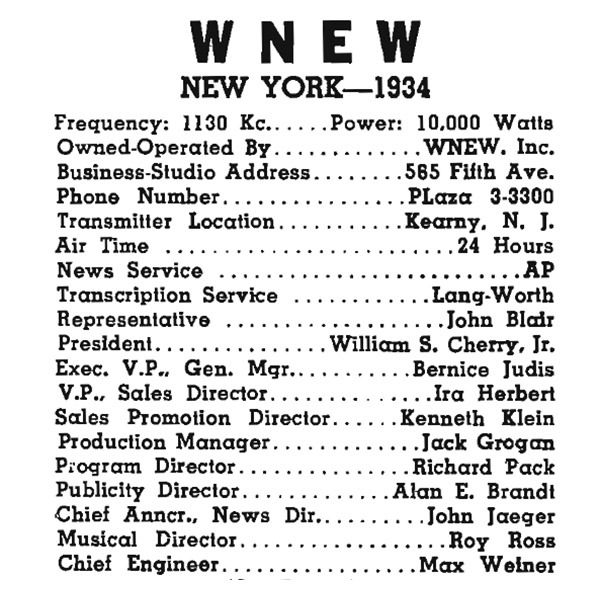
Judis’ other side
There was another side to Bernice Judis. She could be difficult to work for. Ruthless was how it was sometimes described. But once you were accepted into the homey WNEW family, you learned to cope with the less charming side of Miss Judis.
It wasn’t always wise to go on vacations. Another of her important contributions to WNEW was the development of a comedy morning show that eventually became Number 1 in New York radio. Originally, it was Anything Goes with Rayburn and Lescoulie. Lescoulie went on vacation, came back and found that Dee Finch, a staff announcer had replaced him. Now: The Rayburn and Finch Show!
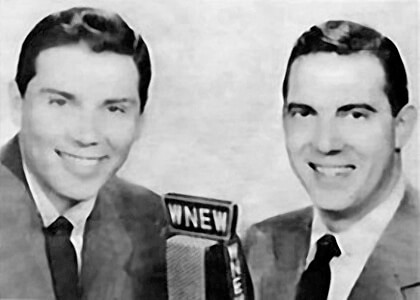
Tudie’s skill in handling and developing talent extended beyond the d.j.’s, and she could perceptively analyze the flaws in the morning show. The show was supposed to be mildly amusing, in between the records, time and commercials, but occasionally Rayburn who was the comic of the team, pressed hard and long for laughs. Judis had an incisive critique for him: “Gene, in the morning, a little funny goes a long way. Relax! You don’t need so many jokes.”
She knew the strengths of her executives; that’s why she hired them. But one of her management skills — not easy to take, if you were on the receiving end — was her habit of probing for weakness, and then socking it to you.
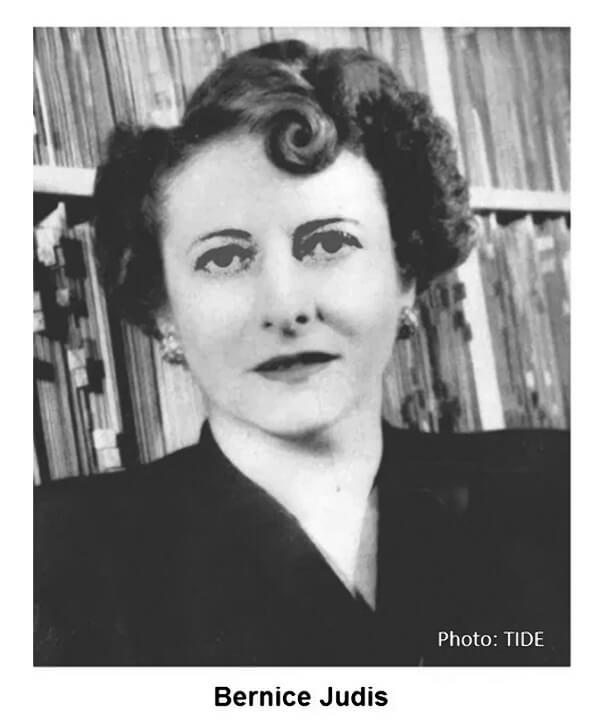
I had been programming chief for a year, working 10 hours a day and I thought doing very well; and I really was but not active enough for Judis in one of the station’s most important and profitable areas.
I was just about to leave on a late Friday afternoon for a long delayed vacation when she pounced on me.
First the windup: “Dick, have you talked to Martin Block recently?” When I said no, then came the fastball: “You don’t like Martin do you?”
Taken off guard, I gulped, and had to admit, “No, I don’t Tudie. I have been avoiding him because he is difficult for me to handle.”
Meaningful awful pause. Then, slowly and coldly: “Darling, I don’t pay you to do just the things you like.”
It was a hard lesson; her lectures were short but they zinged right to the point. She was right, and it was a practical lesson for a new program manager to learn. It’s a sermon I later delivered, to good effect I hope, to young men who worked for me at NBC and Westinghouse.
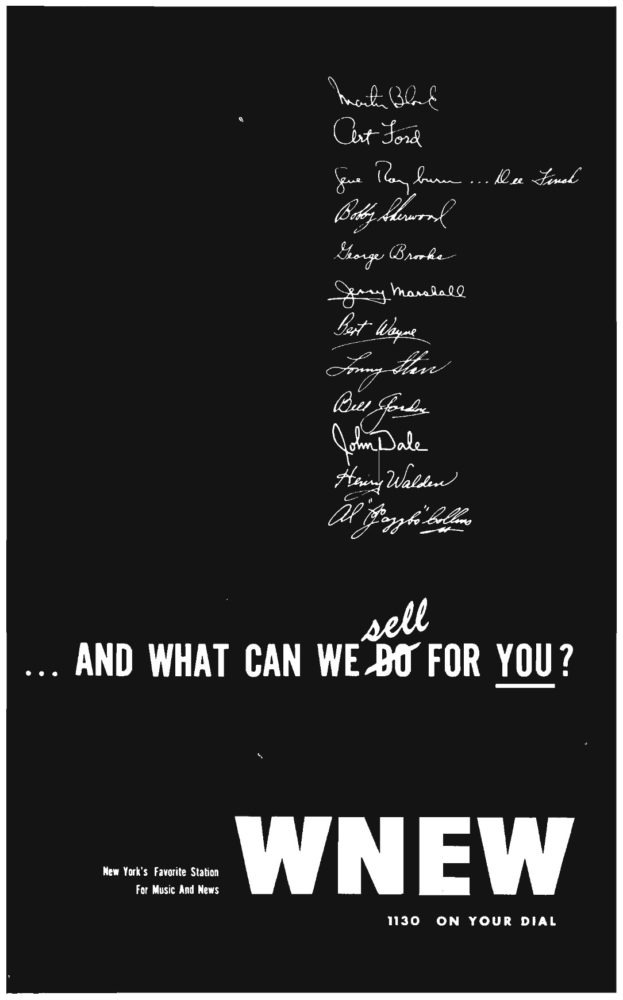
To give them credit, neither Judis nor (Director of Sales Ira) Herbert ever let their personal relationship interfere with their position in the station, either after they were married, or in the difficult days when Ira was trying to get a divorce from his first wife. When he finally was free to marry Tudie, it was an event at the station. We all cheered and were glad for them. Now, finally, for some, she became “Mrs Herbert.” Some wag once described the WNEW of Judis and Herbert as a “mom ‘n’ pop store.” Well, sort of. A sophisticated one. Married or unmarried, Bernice Judis and Ira Herbert made a rare team.
One of the achievements that Bernice Judis & Co. should get credit for is its role in the development of out-of-home audience measurement. Judis didn’t herself find the way to evaluate that vast radio audience, but she certainly inspired — and prodded — the research organizations and the industry to tackle the problem. Like most of the smart local operators, she realized that the independents were being short changed in the ratings battle against the network stations, because ratings did not include all those listeners who were tuning more and more to their stations.
Some Closing Thoughts from Marlin…
As Richard Pack wrote — which appears in Chapter Three of our story —
“Working at WNEW in the ’40s and early ’50s was a postgraduate course in broadcasting and station operation, although the systems and style of the lady would probably not be endorsed by the Harvard School of Business. Miss Judis could be a tough boss, but — to use a good old-fashioned word — inspiring. While her ways were not orthodox, she was a leader, a manager.”
Thanks to some historic radio audience data recently provided to me by radio ratings maven Chris Huff, let me share two pieces of enlightening information:
- In Chapter Two, I included an ad which WNEW claims to be the top-rated “independent” radio station, sourcing the audience surveying firm of the era, Crossley. The fact is, in this 1938 report, other than the four “network” stations, there are only two stations which attained enough reported listening to have percentage numbers included … WNEW and WMCA. And, extrapolating from what little data is provided, without the Make-Believe Ballroom, WNEW would have been, as I’ve been known to say, “down in the noise” as well.
- In a Pulse survey from April 1947, while the station had reasonable listener strength across much of the day, from a “revenue” aspect — as was alluded to by Richard Pack — WNEW still was very dependent on the Make-Believe Ballroom, which had twice the audience for both the late morning and dinnertime editions as any other programming on the station.
The Bernice Judis Era
The Bernice Judis era, which spanned 20 years, ended in 1954 when WNEW, that she and husband Ira Herbert had become part owners of in 1950, was sold. In that same year, Martin Block would leave the Make-Believe Ballroom — a show which had been created in the station’s earliest days to answer a need and had been nurtured by Tudie and Martin into WNEW’s premier offering, where it remained two decades later — and the station to host a similarly-formatted afternoon show on the ABC Radio Network.
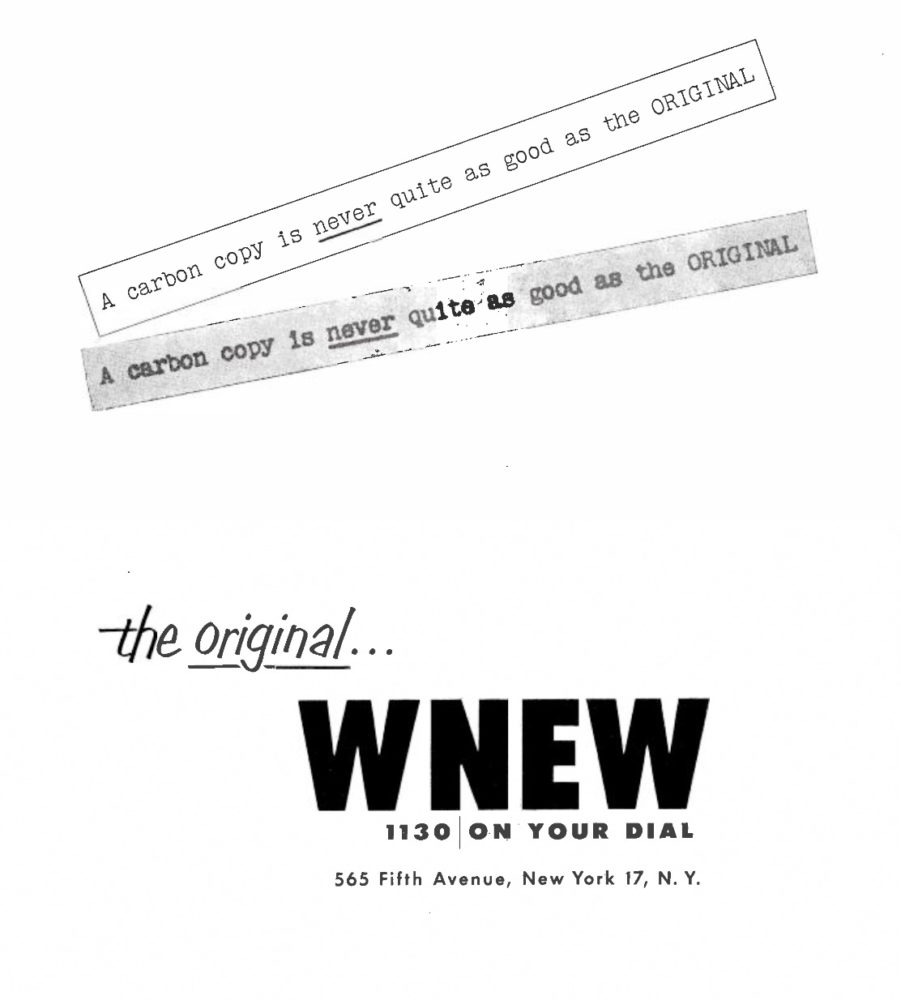
While I was a regular listener to this station from the later 1940’s well into the 50’s, I knew nothing at the time beyond what I heard come over the air. I’ve got to say, though, that once having read this 1983 article, I became a Tudie admirer and felt an immediate kinship with her … knowing she had come to the job with no radio experience and that, up to this time, her greatest accomplishment in life was winning a minor golfing tournament in New Jersey!
Professional Listener
One’s official job title may be general manager, program director, operations manager — those are industry-assigned titles — to my mind, the description of the role she fulfilled is one that I’ve applied to myself over the years … Professional Listener! – meaning our function was not to perform or even possess any of the talents for performing: rather, being blessed to hear with the ears of the listening audience! Every human is gifted with a set of talents … in the case of Tudie and myself, it’s being instilled with an intuitive sense of what was right, the right music, the right words and the right amount of each … and being able to coach and convey this to those gifted as performers.
I know this may sound a little “high hat,” but I don’t know how else to describe it. Without possessing this gift, I don’t know that I would have made any mark in the broadcast industry, or that I would have ever even held a position in it, as I don’t know what I would have had to offer.
The “Copy Cats”
Regarding being monitored and copied by management of stations in other markets, as discussed in the Chapter Three portion of Mr. Pack’s article, we know for a fact that after WRFM’s major blast into the upper ranks of the ratings in NYC … and the same occurring not long after our Bonneville sister KBIG in Los Angeles experienced a dramatic ratings increase following the installation of our format in July 1971 — the manager or PD from station after station would fly in and hole up in a hotel room, making notes of promotional phrases and lists of songs being played.
Meanwhile, I’d love to hear from you! What are your thoughts regarding WNEW-AM and its place in radio history? Could an updated version of such a station be successful today? (Please use the comment form below this article.)
One More Story…
Finally, before I wrap up this expansive review of the Bernice Judis era of this legendary station … one more story: If you’ve read my memoir, you know that Spike Jones was fairly high up on my list of favorite musical artists. With the Second World War raging in Europe, in the fall of 1942, Spike and the Gang released an Adolf Hitler “tribute” song titled “Der Fuehrer’s Face.”
Well, after being handed a copy, Martin Block decided to give it a spin on his Ballroom show! The hilarious song brought such immediate action with calls to “play it again, play it again” … he was struck with an idea – use it to sell U. S. War Bonds. So he would set a goal of several thousand dollars in bond commitments and when listeners pledged that much, he’d play the song again. The station claimed they sold at least a quarter of a million dollars of war bonds in return for several dozen plays of the song!
WNEW References
As promised, here are References/Links to various sources of WNEW historical information:
First, thanks to David Gleason’s fabulous American Radio History website, you can access multiple pages in the 2003 three-volume Encyclopedia of Radio which mention WNEW and its staffers.
There’s an active website, WNEW1130.com with interesting stories and photos, many written by individuals who were there over the years.

The Airwaves of New York offers an illustrated history of the 156 AM radio stations which operated at some point in the metropolitan area between 1921 and 1996. It’s available from Amazon and other sources.
The station itself published a hard-cover book in 1984 on the occasion of its 50th anniversary, titled “Where the Melody Lingers On“. There appear to be a few used copies available at Amazon and possibly elsewhere.
The majority of the visuals included in this extended story are found in the annual Broadcasting Yearbook and similar industry publications for the years from the mid-1930’s through 1954.
Image Credits: "More Than Ever…" courtesy of AmericanRadioHistory.com, "WNEW Staff" courtesy of AmericanRadioHistory.com, "Rayburn & Finch" courtesy of WNEW1130.com, "Bernice Judis" photo credit: TIDE, "We Sell For You" courtesy of AmericanRadioHistory.com, "The Original WNEW ad" courtesy of AmericanRadioHistory.com
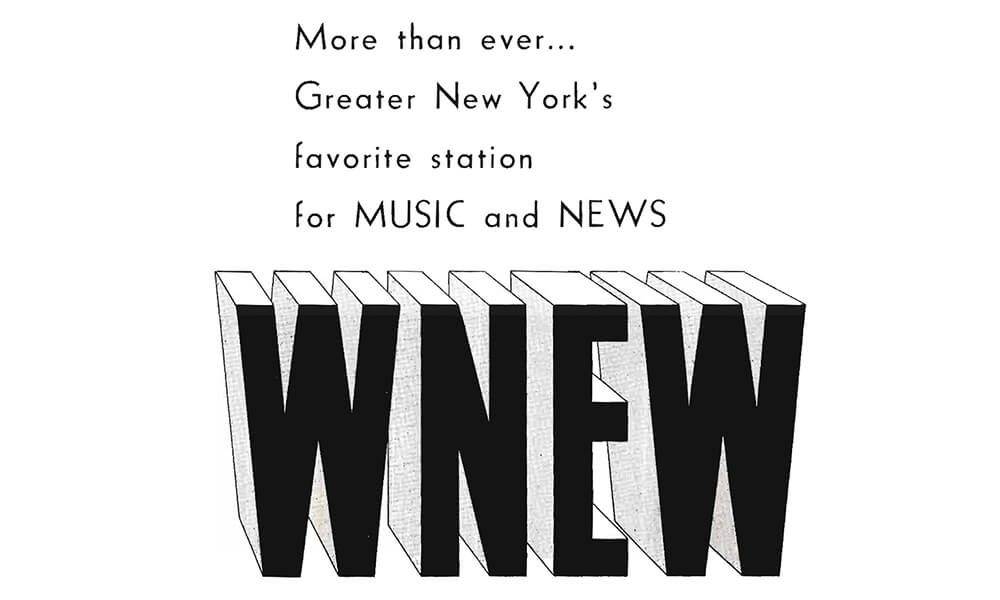

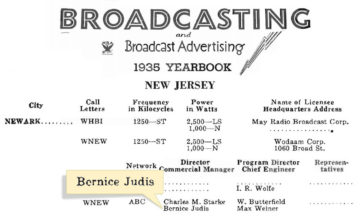
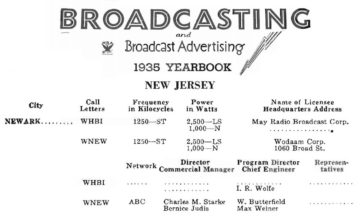
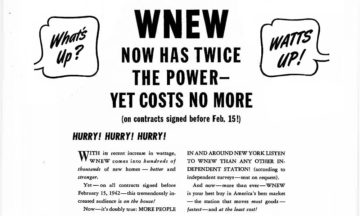
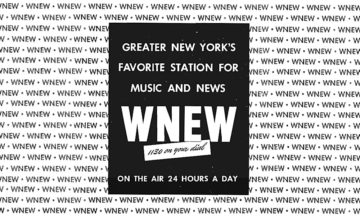
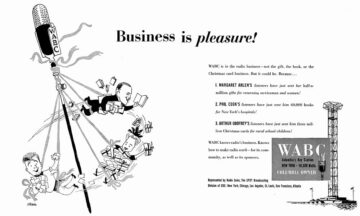

Great article, I enjoyed reading it. I worked at WNEW 1130AM from 1974-1983 in sales and later Sales Manager. First we were at 565 5th Avenue and later moved to 3rd Avenue and 42nd Street. World’s greatest radio station, it was an honor and a pleasure to work there, best time of my life. George S. Kalman
Thank you, George … great to hear from you!
Outstanding series, Marlin. I was thrilled (no lower adjective) to see that Bill McGrath had, as told in song-and-fable, indeed tried to get guidance in the WNEW school of radio to elevate WHDH-AM, Boston to its eventual lofty perch. Thank you for your efforts! Great radio history!
Peter Swanson
WBCN-FM, WJIB-FM, WHDH-AM & FM and faithful copy of your WBCN-FM Beautiful Music format – with some added spice at WQRC-FM. We were blessed to work in Radio when melody mattered!
Thanks, Peter. Those call letters are all familiar to me – seems I even worked at a couple of them. And, I even have a photo somewhere of my wife Alicia holding her “Pops By the Sea” umbrella, celebrating an event in the later 1980’s, when WQRC brought the Boston Pops to Hyannis for a summer concert! (We had our house in Brewster at the time.)